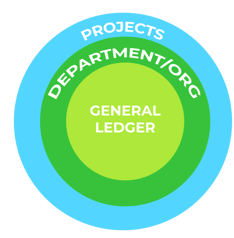Every project based business requires projects to keep it running smoothly and growing, so why not choose an ERP system that is built to manage them? A project based ERP system can help a business streamline and automate its project management process to avoid delayed projects, a lack of skilled employees, and unbilled hours. In short, project based ERPs are designed to promote project success and company growth.
But what about generic ERP systems? While they have a few benefits, there are a few key differences between generic and project based ERPs.

Generic vs Project Based ERP Systems
Generic ERPs are still prevalent in the marketplace today, but they are costly and very difficult to maintain if your business is projects. These ERPs typically do not have the project as the center of the universe. Generic ERPs focus on the account and the department/organization, and the project is accounted for with a separate tool. In a generic world, the project is an afterthought.
Why Project Based ERP Systems?
In a recent blog, we discussed what to look for when choosing project-based ERP software. But why are project based ERP systems the clear choice for project based organizations? We explore 8 main reasons below:
- Transactions are attached to a project, department/organization, and a general ledger account. This ensures that transactions do not get lost in the midst of a project and prevents team members from tracking them down while running expense reports.
- A time collection system attaches charges directly to the tasks that the individual works on. This makes tracking billable hours much easier and more intuitive.
- Costing architecture is tailorable for each project and task. No two projects are alike, so why should there be a single costing architecture? Costs are often outlined in a Work Breakdown Structure (WBS), which project managers and standard employees alike use to monitor the progression of the project.
- Visibility is provided into the financials of each project (i.e. profit, cost, billing). This visibility and transparency is crucial for all team members be aware of what the project is costing and make adjustments if needed.
- A resourcing tool provides project managers with information on what skills are available at what time. This prevents surprises and winding up with a lack of skilled employees to handle a project.
- Complete financial reporting with the project in mind. Financial reporting of a project plays a large role in the project being an efficient success or dragging on for months.
- Project based key performance indicators to help drive the organizational and project goals.
- System controls that send notifications when project restraints are met, configured to the needs of your business
To Best Manage Your Organization's Projects, Trust Unanet's Project Based ERP System
Project based companies require project based ERP systems. It’s as simple as that. Unanet's project management software allows you to align projects to corporate strategy, lower project management costs, gain key real-time project insights, and much more.
Learn how you can unlock greater productivity, operational efficiency, and profitability with project clarity and control, download our ebook, The Business of Projects for dummies.

